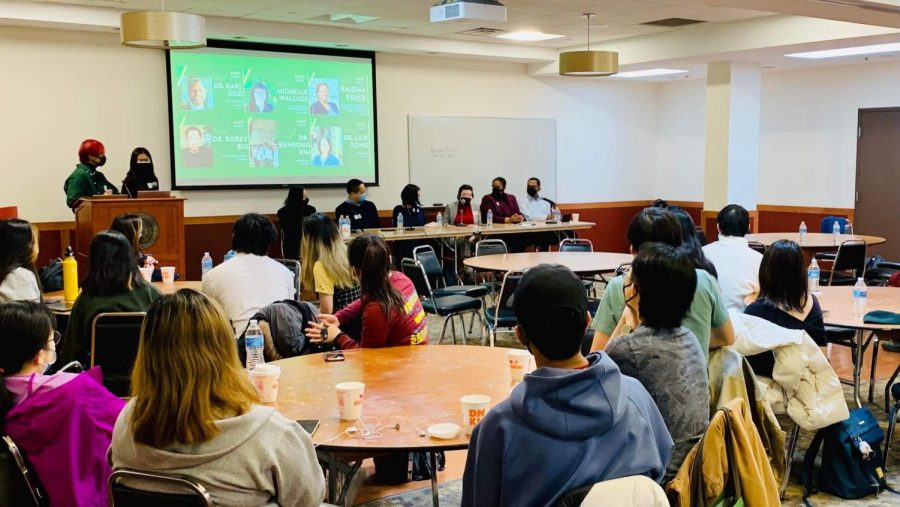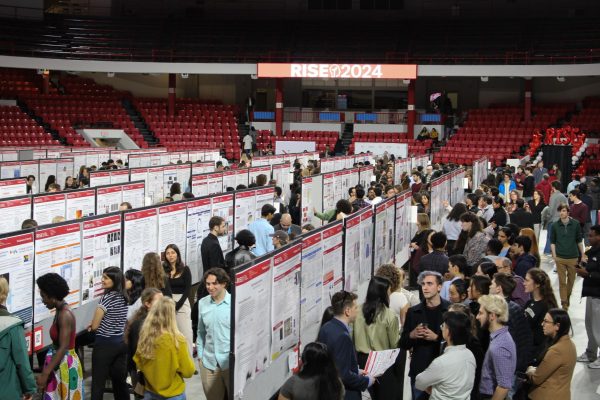Asian American community advocates for new faculty hires, creation of Asian American studies program
Photo courtesy of Claire Blaufox
Students at the Asian American Community Conference March 6.
March 27, 2022
Late last month, members of the Northeastern University Asian American community leaders sent a letter to two academic deans hoping to establish a stronger foundation for the existing Asian studies program at Northeastern.
The letter, which was sent Feb. 28 to Dean Uta Poiger of the College of Social Sciences and Humanities and Dean Elizabeth Hudson of the College of Arts, Media and Design, also asked that an Asian American studies program be created at the university.
In March 2021, student leaders from the Asian American Center’s programs, known as Team 442, as well as other Asian, Pacific Islander, Desi American, or APIDA, identifying students attempted to bring more attention to the need for Asian and Asian American studies on campus by publishing an open letter.
In the letter, they cited the lack of tangible action items from the university following the murder of six Asian women in the Atlanta-area, and how there is a lack of opportunities for students to take classes about Asian American issues at Northeastern. They outlined a number of changes they wanted to see from the university, including the chance to meet with administrators, increased resources to APIDA communities and programs at Northeastern and around Boston and increased culturally appropriate mental health resources for minority students, among other requests.
After several meetings with faculty and administration, a cluster hire was authorized for Asian American Studies in the College of Social Sciences and Humanities, or CSSH, meaning that the university would actively seek out multiple tenure-track faculty members. In this most recent follow-up letter, student activists advocated for the hiring of no fewer than six new faculty members.
“When we initially came forth to engage in this dialogue with you, we stressed the need for the consistent offering of Asian and Asian American Studies classes,” the February letter read. “We also noted that in order to accomplish this, it would be imperative to hire a multitude of tenure-track faculty to ensure that there are permanent resources for permanent needs on campus. Currently, Northeastern has only a handful of tenure and tenure-track faculty who are experts in Asian American Studies.”
Lauren Bough is a member of the Asian Studies Student Advisory Board and is one of the named signatories of the letter. Bough graduated from Northeastern in December 2021 as an international affairs major with a minor in East Asian studies. Although she has already graduated, Bough emphasized the importance of ensuring that these changes are implemented for future students.
“What we’re trying to do with the cluster hire is we’re trying to create provisions where the Asian American and Asian studies courses become a priority,” Bough said. “To do all the things that we as an advisory board have imagined, we need that permanent tenure-track faculty that is there to provide permanent resources for permanent needs.”
Bough also cited that while Northeastern’s peer institutions have these programs in place, Northeastern refuses to fill this gap in their curriculum. She argued that while changes have been made, the university has a long way to go.
“UMass Boston is one of the most renowned programs for Asian studies and Asian American studies, and it’s right by us. … BC, BU, all of these schools have programs that are being supported. And frankly, the Asian studies program at Northeastern is being neglected,” Bough said. “That has changed but it didn’t change without people pushing for it. If we don’t continue to push it, nothing is going to happen.”
Professor of history and Asian studies Philip Thai echoed these thoughts. Thai assisted students in drafting the letter and chairs the Asian American studies cluster hire. Thai explained that Asian American studies have yet to be integrated into studies at Northeastern due to its previous history as a commuter school.
“The fact that we don’t even have a program speaks volumes,” he said. “Northeastern is quite an outlier in that sense. It has nothing. In the history of the curriculum, as far as I know, there’s only been two courses in the 10 years I’ve been here. Those courses have been taught very irregularly, by non-permanent adjunct faculty, which tells you what Northeastern thinks of these classes.”
Thai explained that the cluster hire authorization means the university only has to hire more than one faculty member. However, he said he believes that hiring two or three professors is not enough.
“The administration is willing to make a few hires, but more than one could equal two,” he said. “I think that would be a great disappointment from my perspective. The more the merrier, but the more important it is, because it creates a necessary sizable core. … So hiring these faculty, as much as it sounds like it’s a critical mass of people, doesn’t necessarily get us to square one, we’re coming from square negative 10. We have a considerable distance to make up.”
Thai said that the hiring committee put out the job application in early November, and they received over 150 applications. Now they have picked their finalists, made their recommendations to CSSH and are inviting six candidates to visit campus virtually to meet and talk with students. One meeting occurred March 21, while other meetings are scheduled for March 29, March 30, April 5 and April 7. Thai encouraged students across the university to speak with these prospective candidates. Students can find the links to these meetings online.
“I asked students to show up and make their voices heard,” he said. “These [candidates] are the future of Asian American studies at Northeastern. So meet with them, talk with them, let them know what you think, what you want and also this show of force on the part of students will send a message to the university that the students are watching this, they’re keeping close tabs on this. This show of force, this display of continued interest is critical. I have no doubt about that.”
Thai said it was the passion and drive of students that allowed for this change to occur.
“Student activism is what made this search possible in the first place,” he said. “I can say with no exaggeration that if the students didn’t do this, this search would not have happened. The university would not have known or would not have cared enough to make this a priority.”
Poiger, the dean of CSSH, responded to the letter in an email to students the day after it was sent. Students shared this email with The News.
“I will confer with Dean Hudson and others and will be glad to meet with you in the next weeks,” she wrote. “Please be aware that your letter contains some misunderstanding about how faculty appointments are made at NU, about the important role that teaching professors play at the institution, as well as the resources available in departments and programs. I look forward to clarifying these matters.”
Bough said she was dissatisfied with the response.
“We weren’t ecstatic about the response. It’s a start, we’d rather have talks than them say flat out ‘no,’” she said.
Moving forward, Bough said she hopes that tangible change can be made so that future students can reap the benefits of an established, well-supported program. Team 442 will meet with Poiger April 7.
“We’re going into these discussions with hope that we’ll get our goals out of this,” she said. “I want to do this to be able to have students take the courses that I was not able to, that I wish I could take now. That’s what keeps me motivated.”


















